Destructive Chewing Behaviors
What could be more stressful than coming home from a long day of work to find your living room looking like the frat house from the movie Animal House? As you start to pick up the mess, you make a mental list of the cost of everything your bully destroyed. You’re feeling bummed out and stressed out, and your bulldog knows it. You give your bully the best of everything: great toys, a fancy bed, and yummy chewies.
Why would she do this to you?
Why Is Your Dog a Destructive Chewer?
Dealing with a dog with destructive chewing behaviors can be one of the most upsetting challenges a dog owner faces. But chewing is a normal behavior for puppies and adult dogs. After all, a dog uses her mouth to explore her surroundings. So how can you teach your dog what she’s allowed to chew and what is off limits? The first step in solving the problem is understanding why your bully is chewing. Here are some of the reasons why dogs chew:
1. Medical Problems
Have you ever heard of pica? It’s a medical condition that can affect humans and dogs. When pica occurs in dogs, it is triggered by malnutrition, which is caused by a poor diet or parasitic infestation. Pica can cause cravings in your bully that lead her to chew on things that have no nutritional value. Tummy trouble and nausea can also cause your bully to chew, which she uses as a coping mechanism to ease her discomfort.
2. Improper Weaning
The appropriate age to wean puppies is about 7 to 8 weeks. Some puppies that are weaned too early develop fabric-sucking behavior, and the habit can continue into adulthood. In fabric-sucking behavior, a dog will lick or suck fabric, and the behavior can easily lead to fabric chewing. In the worst cases, a dog will spend extended periods of time compulsively suckling fabric, and she may become so focused on the habit that she ignores everything around her when she is engaged in the behavior.
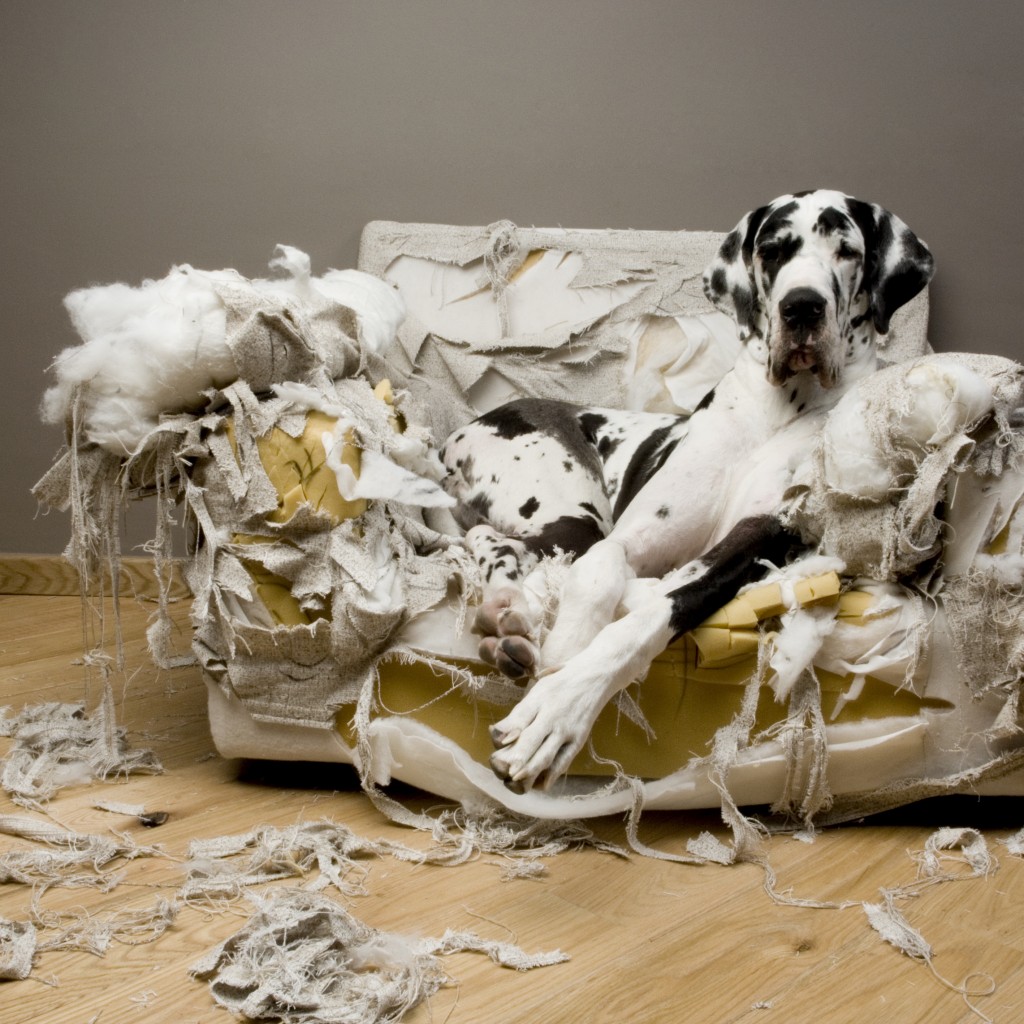
3. Hunger
Has your bully packed on a few extra pounds? If so, you are probably limiting her food rations and caloric intake. A hungry bully may engage in destructive chewing behavior, in which case she will chew on things that smell like food. Anything you touch while preparing or handling food can become her target. Even your remote control is at risk if you use it while you are snacking.
4. Puppies That Are Teething
Just like human babies, bully pups go through a phase when they lose their baby teeth and grow their adult teeth. And like human babies, puppies experience pain when they are teething. Puppies start teething when they are 3 to 8 weeks old, and they complete the process when they are 4 to 6 months of age.
Chewing is how teething puppies attempt to relieve their sore gums, and it also helps their adult teeth emerge. However, some puppies develop a habit of chewing that they continue even after they are done teething.
5. Normal Behavior
Chewing a bone or a stick for a few hours is perfectly normal behavior for a wild dog or your pet. Dogs chew for stimulation, and they chew for entertainment. Healthy chewing is important because it helps keep your bully’s jaws strong and her teeth clean.
6. Boredom
Does your bully get plenty of exercise every day? What about play time and social interaction? If not, she may chew as a way to pass the time.
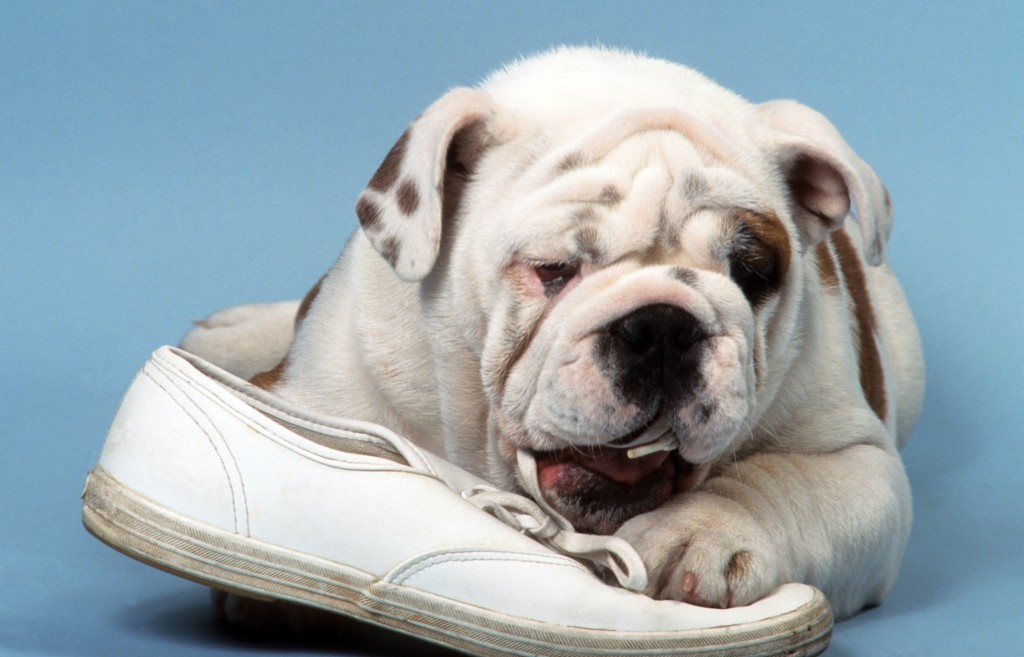
7. Seeking Attention
Because dogs are social animals, they require attention from their owners daily. If your bully wants your attention, she may chew on something that she knows is off limits. Why? Because to your bully, negative attention from you is better than no attention at all.
8. Stress, Fear, or Frustration
When your bully is feeling nervous or upset, she may chew to relieve her stress. What scares your dog? Thunderstorms or fireworks? And what frustrates your dog? Seeing squirrels outside that she is never allowed to chase? Chewing is a natural coping mechanism for dogs.
9. Separation Anxiety
Separation anxiety is one of the most common causes of bad behaviors in dogs. If your dog primarily engages in destructive chewing when she is left alone, separation anxiety is the cause. Another sign is chewing that occurs mainly near windows and doors. More symptoms of separation anxiety include whining, barking, and pacing, as well as peeing and pooping inside the house.
Destructive Chewing Is Dangerous
When your bully chews up your remote control, your sunglasses, and a couple couch cushions, you know you have a problem. A big, expensive, stressful problem. The last thing you want is to feel angry at your bulldog, but destructive chewing behaviors can ruin a good day fast.
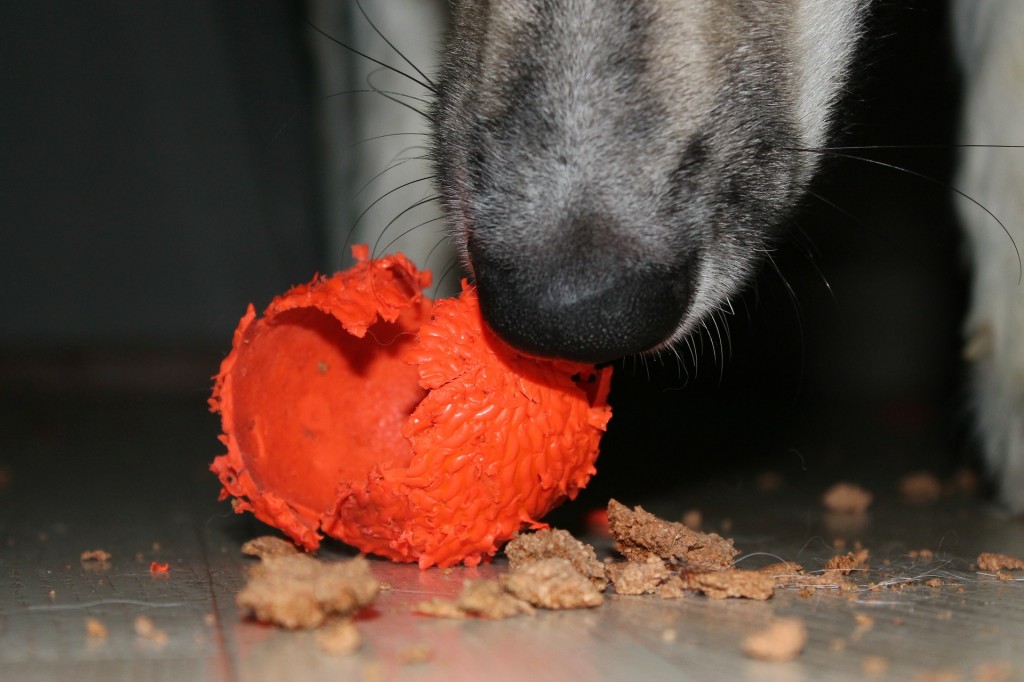
Not only is destructive chewing stressful and costly, it can also be detrimental to your bully’s health. She could suffer tooth and gum damage, and she could choke. Your bulldog’s internal organs are also at risk if she swallows something toxic, or if she eats something that her body cannot digest.
How to Stop Destructive Chewing
After you identify the reason that your bully is being so destructive, you can focus on correcting the problem. The good news is that there are many effective techniques for stopping destructive chewing behaviors. Here’s how you do it:
1. Take Your Bully to the Vet
You need to make sure that a health problem, such as pica or gastrointestinal distress, is not the reason your bully is chewing. A visit to the vet will help you determine if your bulldog is suffering from an undiagnosed medical issue. If so, your vet will prescribe medication and/or a special diet to cure your bully of her chewing problem.
2. Behavior Modification: The Do’s and Don’ts
Once you rule out health issues, it’s time to focus on behavior modification. Whether boredom, teething, stress, or separation anxiety is causing your bully’s destructive chewing behavior, you should make changes to your bully’s daily life to resolve her chewing problem.
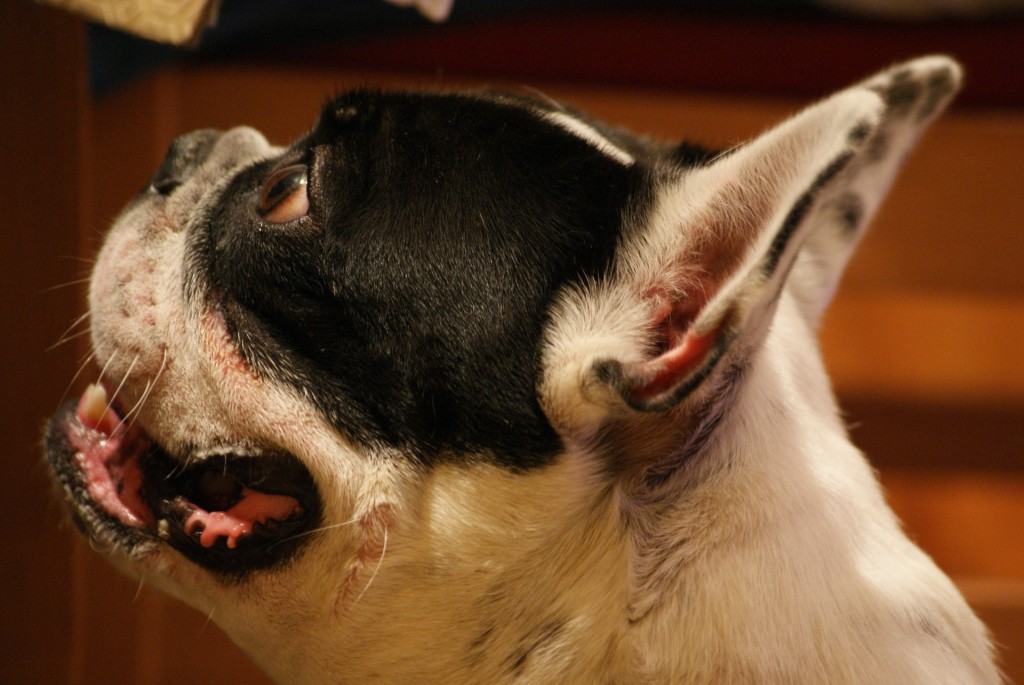
DO have realistic expectations. Let’s be honest. When you bring a new dog home, it’s not a matter of IF she chews up something of yours; it’s a matter of WHEN. Give your bully time to adjust to the house rules.
DO have patience. The most important thing to remember is to be positive and consistent. If your bully chews up your favorite shoes, it can be hard to stay calm. But losing your temper will only lead to more problems, including chewing due to fear or stress.
DON’T be cruel. A few folks recommend some pretty awful techniques for curing your dog of chewing. They advise muzzling or binding your bully’s mouth closed. Not only are their ideas inhumane, but depending on your state laws, they could be felonies.
DO dog-proof your house. While your bully is learning not to chew up your things, help her out by keeping temptation out of reach. Shoes go in the closet. Dirty clothes go in the laundry. And books go on the shelf. The bright side is that your house will be tidy! Once you’re confident that your bulldog knows what is off limits for chewing, you can return to normal.
DON’T give your bulldog old pillows or shoes for play things. It will only confuse her as to which shoes are okay to chew and which are off limits. It’s best to make them ALL off limits.
DO give your bully plenty of chew toys. Make sure you rotate them every few days so that your bulldog does not get bored with her choices.
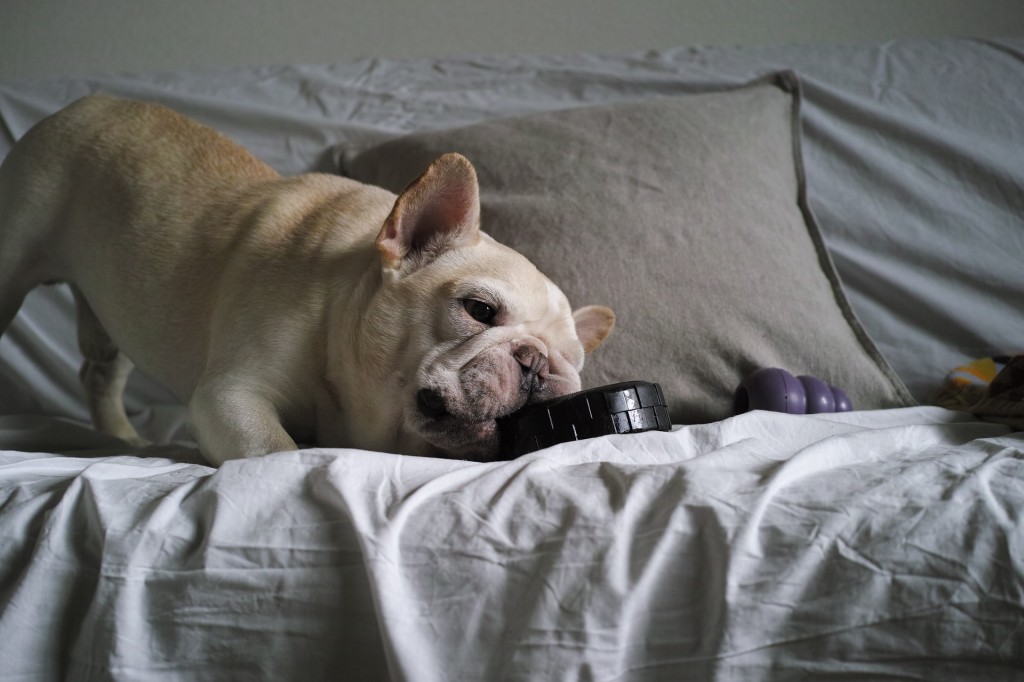
DO tell your bully “NO!” when you see her lick or start to chew something that is off limits. Then give her something she is allowed to chew and praise her.
DO buy your bulldog meat-scented nylon bone chewies as most dogs love them, and they last a really long time. Use the bone to play fetch with your bully a couple times a day. Playtime will make your bulldog more interested in the bone. And the more you play with the bone, the more it will smell like you, which appeals to your bully.
DON’T give your bulldog cooked bones. They can splinter and injure her.
DO praise your bully and offer her an edible treat when she chooses to chew on a toy or bone.
DO give your bulldog plenty of exercise, playtime, and social time. She will be less likely to feel bored and display negative attention-seeking behaviors. And exercising your bully, especially before you leave her alone, will help her to rest instead of chewing while you are gone.
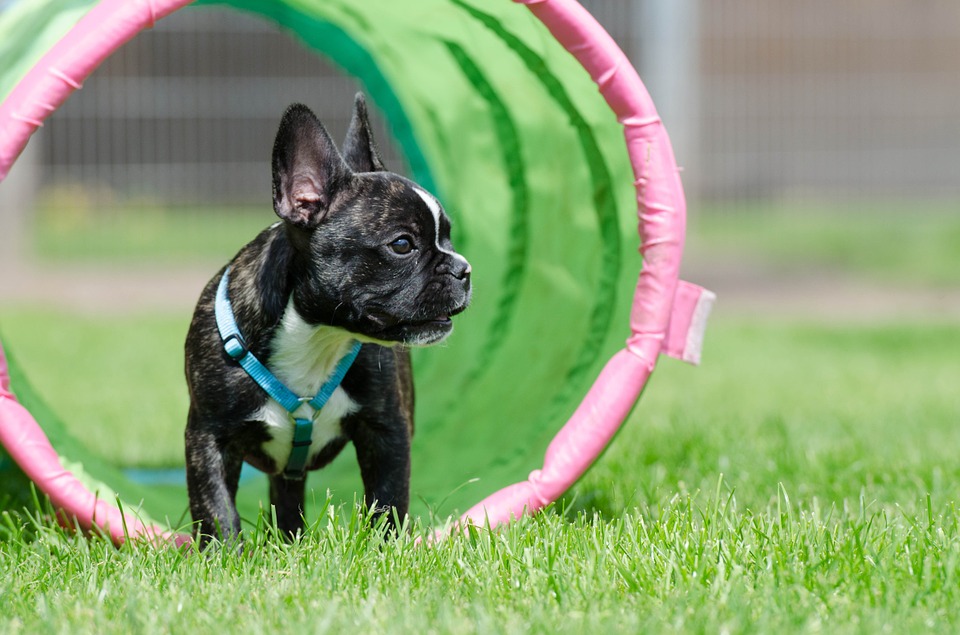
DON’T chase your bulldog when she has something that is off limits. She will think it’s a game and run from you.
DON’T punish your bully if you come home and find she has chewed up something she shouldn’t. She is not capable of understanding that she is in trouble for something she did earlier in the day. If she has a guilty look on her face, it’s only because she can tell you are upset. She is not looking guilty for earlier bad behavior.
DO use a gate to restrict your bulldog to one area of the house while you are gone. Make sure she has water and plenty of chewies, but no access to anything of yours she can destroy.
DO give your bully a toy box to hold all her chewies and toys. Teach her that she can only chew and play with things from the box, and praise her when she chooses something from her toy box.
DO leave music playing to soothe your bulldog while you are gone. A recording of your voice works well too.
DO give your bully herbal calming medications if she is highly anxious at times, like during thunderstorms. You can find a variety of herbal treatments at most pet supply stores.
DON’T make a big deal out of it whenever you have to leave your bulldog. That will only heighten her anxiety.
Let the Training Begin!
Working with your bully to replace bad behaviors with good ones can be fun. She will thrive on the attention, and the playtime will be a blast for you too! It is only natural to feel frustrated when your bulldog has a setback, but patience and positive reinforcement will give her a much better chance of achieving the good behaviors you seek. You will have a better outcome when you focus on her positive behaviors instead of the negative ones!
